The preparation for my interview with Max Mosley has been like no interview preparation I’ve ever done before. I read the subject’s new autobiography, Formula One and Beyond – so far, so normal. And then his interview cuts – ditto. And then I typed his name into YouTube and watch a video featuring covert footage of him being spanked by an assortment of partially clothed women.
Despite all his efforts, it’s still out there on the internet. It is a bit embarrassing. And that’s just for me, watching it. God knows what it’s like for him. How do you cope with knowing there’s a good chance that people you meet are already intimately acquainted with your naked bottom?
“I honestly don’t think about it any more,” he says. We’re in the ground-floor office of his mews house in Knightsbridge, London, just round the corner from Harrods. Even at 75, he has a full head of hair and cuts a rather dapper figure. “I know that if I go to China and have a meeting about car safety, people will Google me. You have to live with it. I just forget about it because there’s nothing to be done. It’s the same thing as when I decided to sue the News of the World. You’re only going to hide if you’ve done something wrong.”
It’s worth remembering how remarkable that decision was, to sue the News of the World. Quite simply, he refused to be shamed. He refused to accept that he’d done anything wrong. “The only question is,” he says, “did everybody consent? And are they capable of giving consent? And the answer to that was yes.”
It was March 2008, long before the phone-hacking scandal, and this was a classic NoW sting: it used a hidden camera to take footage of an S&M session that Mosley had paid for, and published a front-page story accusing him of taking part in a Nazi-themed orgy.
He was expected to slink away with his tail between his legs. It’s a hopeless cause to sue in such circumstances. If your privacy has been breached so profoundly, going to court will only result in your life being spilled across the papers again. “But I just couldn’t do it. My immediate reaction was, ‘It’s just sex for Christ’s sake.’ People do all sorts of odd things. Everybody advised me against suing, though not my family.”
He sued and won, successfully proving that the Nazi story was a fabrication in the high court. “They made it up, and they made it up because if they hadn’t, it would have been illegal to publish the story.” By alleging Mosley was a Nazi, the News of the World claimed a public interest defence for breaching his privacy, but the high court found against the paper and its chief reporter, Neville Thurlbeck, who was later imprisoned for his part in the phone-hacking scandal. It was just the start for Mosley, though. Since then, he’s taken a case to the European court of human rights, bankrolled some of the victims of the NoW phone-hacking scandal, and taken legal action against dozens of other websites, including Google. (He argued that the search engine was linking to illegal images and won a landmark settlement from the company last month, though a confidentiality clause prevents him from saying exactly what it was.)
His legal battles have given rise to what you might call the Max Mosley effect. Or the Max Mosley conundrum. Because if it wasn’t for his determination to defend his private life, he wouldn’t have the likes of me turning up on his doorstep asking intrusive personal questions. Everyone would have forgotten about you by now, I point out. It’d be “Max who?”
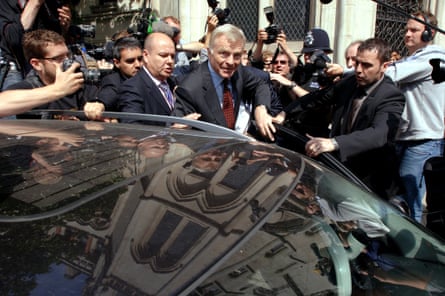
“Oh, I’m sure. I would be much less known. You’d have to search more carefully on the net to find anything.” But then the best and most unlikely thing about Mosley is how well he takes the intrusive questions. It’s not something I’d have guessed. His autobiography contains chapters on his early life and his press crusade, but it mostly reads like it was written by a sober-minded lawyer who’s determined to leave out all the juicy bits.
Which of course it was: Mosley was a barrister before deciding to become first a racing driver and then a racing car manufacturer, eventually winding up as the president of the FIA, the Federation Internationale de l’Automobile, the world body that controls Formula One.
“I just wanted to get the full story down. It’s mostly for the nerds and anoraks who have accused me of all sorts of things over the years,” he says.
He doesn’t mind when I fail to ask a single question about motor racing until the very end of the interview and doesn’t flinch when I say things like, “Tell me about sadomasochism, Max” or, “Your wife seems quite long suffering”. It’s just there are so many more interesting things than motor sport to talk about, a point he doesn’t seem to dispute. He’s much warmer and more open in person than the rather patrician figure he cuts on TV, and a friend who knew his son, Alexander, says in an email how welcoming and generous the family had always been to her and Alexander’s friends.
But where to begin? With his parents, Oswald Mosley, leader of the British Union of Fascists, and Diana, one of the Mitford sisters, getting married in Joseph Goebbels’s sitting room, with Adolf Hitler one of the guests? (Hitler gave the newlyweds a photograph of himself in a silver frame.) Shortly after Max’s birth his father and mother were arrested and imprisoned in Holloway, London (Diana hastily stuffing the photograph of Hitler under the mattress of Max’s cot when the police arrived). Diana must have been one of very few people in the world who was friends with both Hitler and Churchill.
The whole of the British establishment seems to turn up in Max’s story in one form or another. There’s John Betjeman, Mosley’s godfather, and Robert Bolt, his teacher, and the half-siblings by his parents’ first marriages to the Guinness and Curzon clans. There’s Unity, Diana’s younger sister, who shot herself in the head after Britain declared war on Germany, sending a note to Hitler beforehand saying she wanted to be buried wearing her Nazi badge. And the Duke and Duchess of Windsor, who were his parents’ friends and neighbours during their later years in Paris. (In the book, Mosley writes how the Duke of Windsor would fondly reminisce about what might have happened if he’d been king and Oswald Mosley prime minister.)
When did he become aware of his parents’ rather extraordinary history?
“Probably around the time I could read. When I was maybe five or six. But the thing about being a small child is that you don’t question it. Like when I was taken off to Holloway, I didn’t think, ‘Well, it’s a bit odd my parents are in prison.’ They just were.”
So, was Hitler just the funny man in the wedding photos?
“Not quite. I knew he was a historical figure of some kind. And I knew my father had only met him twice and didn’t like him. She really liked him, of course. My mother never made any secret of the fact that a) he was a friend, and b) she liked him.”
He doesn’t remember any reverberations after the war when the truth came out about the concentration camps. He says he only discussed that with his mother once he was grown up. Was it a gradual process, then, of you thinking that maybe mummy’s friend isn’t quite as nice as she thinks? “Yes, it was. And she would have perfectly rational explanations. People do. It’s always struck me that the suggestion that Hitler was some sort of monster, which in a certain sense he was, conceals the fact he must have… How did he get from being a house-painter to running one of the biggest, most civilised, sophisticated, cultured countries in the world with the population behind him? And it’s no good pretending they weren’t. That’s why he got elected.”
And Diana never pretended otherwise. There’s a remarkable film of her on YouTube where she’s in her 70s but still exquisitely beautiful, her eyes a glacial blue (Evelyn Waugh dedicated Vile Bodies to the young Diana, saying “her beauty ran through the room like a peal of bells”).
She doesn’t try to whitewash the past, I suggest. She was very upfront, saying she was very fond of Hitler – though she does describe what he did as wicked.
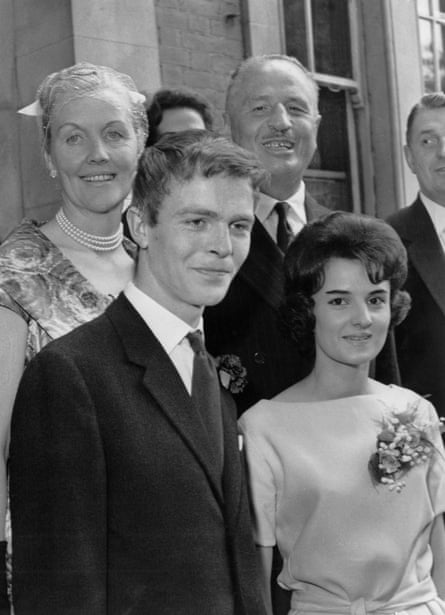
“Yes, I think in one sense she was quite right. I think there’s nothing more contemptible than people who pretend they weren’t [something] when they were. I mean, if you were, you were. You say maybe you were wrong, but if somebody asks you your reasons, you give your reasons.”
Do you think you’ve inherited a bit of that attitude?
“I think so. One of her faults was that she wouldn’t give an inch. Like when she was detained. They used to have these sort of hearings to give it a fig leaf of some sort of justice, and she could have easily said, ‘I’ve thought about this and I think I was wrong about some of the stuff.’ And they’d have probably let her out. But it just wasn’t in her nature. In a way, I sort of admire that. I think you’ve got to be true to yourself.”
She was certainly that. Even her own sisters petitioned for her to be sent back to prison when she was let out, and, in records released in 2002, MI5 agents described her as “far cleverer and more dangerous than her husband”, adding that she would “stick at nothing to achieve her ambitions”. What I notice in his autobiography, however, is that she’s entirely absent. Mosley writes about how close he was to his father, but he’s almost silent on the subject of his mother.
“That’s true, actually, yes. Well you see, she didn’t play a huge role in my life. I mean I got on very well with her and she loved jokes, my mother… but she was in prison when I was young. And then there was a nanny. And in those sort of families, you were raised by the nanny…”
So far, so orthodox. At least for the upper classes in the inter-war years. Because if there’s one thing we think we know about grown men who like to have their bottoms spanked, especially British men of a certain age, it is that it dates back to their time at boarding school, when Spencer Senior gave them a good flogging. But in Mosley’s case that just doesn’t seem to be true.
“No,” he says. “Certainly not. Nobody ever touched me as a child. And that is the conventional wisdom but it’s become apparent that there are an awful lot of young people who are into it, a lot of young women, and nobody ever touched them as a child.”
He has neither read Fifty Shades of Grey, he says, nor seen the film. “But people I know who are interested in these things all say it’s very what they call ‘vanilla’.”
Has it amazed you that S&M has gone mainstream in a few short years? The Fifty Shades series has sold more than 90m copies worldwide.
“Completely. It’s like being gay… When I turned 21, it would have been a criminal offence to have an affair with another man. Now that’s unthinkable. And people like Paul Dacre [the editor of the Daily Mail] or George Carey [former archbishop of Canterbury] pretend that there’s something special about S&M. Well, there isn’t. It’s just sexual activity. I think most people just accept it’s another aspect of sexuality and they accept it as that.”
And then he gives me a short explanation on the main practices of sadomasochism. Because as well as being a spankee, when I watch the video I realise that he’s also a spanker. “There are people that are only dominant,” he says. “And there are people who are only submissive. But there’s a large group of people who are what they call ‘switchers’ and they switch from one to the other. Of course, some would be predominantly dominant and to a lesser extent submissive, and vice versa.”
What’s most remarkable is how unfazed he is by my questions. He’s so no-nonsense. I could be asking him what his favourite colour is or if he likes golf. Doesn’t he mind?
“I don’t mind talking about it in the abstract but I wouldn’t talk about it vis-a-vis me because to do so… That weakens my position if I want to sue somebody for breach of privacy.”
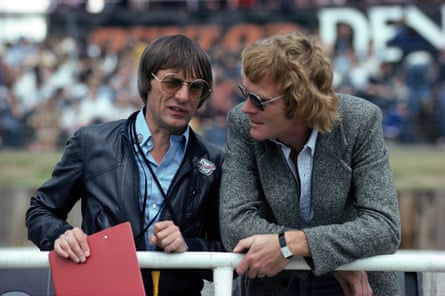
But, nonetheless, he says it’s something that he’s been interested in since the age of around four. “I’m a real believer that it’s just something that is hard-wired into you. Like being gay.”
You think it’s genetic?
“I don’t think either of my parents were the slightest bit interested… But then with genetics, you just don’t know. It could come from much further back.”
In that interview with Diana, I say, she was asked about Oswald’s affairs and the interviewer said something like, “You didn’t mind?” And she said, “Well I obviously minded but it didn’t make much difference.” Were you aware of that as well?
“Not really. It’s pretty obvious to me now that he was at it but it never crossed my mind at the time.”
Max married Jean Taylor, a policeman’s daughter from Streatham, when he was 20, and they’re still together. But he also told the high court that he’s practised S&M for years, and that his wife knew nothing of this until she read about it in the News of the World. Do you think your father’s behaviour had any impact on your own?
“Possibly, yes, I don’t know. If I wasn’t aware of [my father’s behaviour] then there wouldn’t have been any sort of direct relationship. I don’t know if it’s to do with sex but there’s a quote I read somewhere that’s always stuck in my mind: “Around every corner I meet my father.” Because you see your father in yourself. You find yourself doing things as you get older that your father did that you disapproved of. I can see, in those ways, if you forget about sex, I am a lot of him.”
It’s a difficult legacy in some ways. In the book, he makes it clear that the family name is something that he simply can’t escape. As a young man he carried the weight of his father’s fascist beliefs on his shoulders too, though back then, he says, he also shared them. It’s one of the reasons he cites for going into motor racing, where nobody knew his name and, if they did, “they assumed I was related to Alf Moseley, a coach builder from Leicester”. He and his father got on, he says, because “he liked the fact that I was into sport and did all sorts of crazy things”. And when I point out that his mother was at one time called “the most hated woman in England”, he corrects me. “Actually, for a time, it was level pegging between my mother and my father for who was the most hated person in England.”
It’s a lot for a child to deal with, any child, though he says he never experienced bullying, largely perhaps because he barely went to school. He was educated by a series of mostly inadequate governors and for a long chunk of his childhood in Ireland he simply roamed free. And anyway, he says, the father he knew, and whose views he read in his books, wasn’t the figure he was portrayed to be.
“People forget that he was a Labour minister. That he was on the left of the Labour party. He really minded about social injustice, things like children with no shoes and extreme poverty, and he decided he had to do something about it. He could have stayed in the Labour party and at some point probably led it but he wanted to do something about it. He was, I think, very courageous. The fact that he may have been wrong is a separate thing because you can be wrong about all sorts of things. Yes, he got into trouble for being anti-immigration. Well, now everybody’s anti-immigration. It’s a small island, it’s nothing to do with race, it’s all to do with numbers.”
Was he antisemitic? “Not to my knowledge. He always said he wasn’t and I never heard him say anything antisemitic. He rated cleverness very, very highly. And if you rate cleverness highly, you can’t be antisemitic.”
It would be easy, I point out, to construct some cod-psychological theory around the idea of a conflict between the affectionate father who you loved and the fascist leader the world hated. Do you think on some level that you felt that you deserved to be punished?
“The thing is, I’ve never felt the slightest guilt about my parents. Not the slightest. I wouldn’t be here if it wasn’t for them. I wouldn’t be me if I didn’t have their genes. I am what I am. I think psychologists and psychiatrists tend to have these theories for which there’s no scientific basis – a bit like medicine in the 17th century. These theories can sound quite plausible, but God knows whether there’s any basis whatsoever.”
Freud would have a field day, I point out. The distant mother who loved Hitler, but perhaps not so much you… Have you ever read anything that has chimed with your own experience?
“No. But I’ve never really studied psychology. I’m a real believer that things are hard-wired. I know people who have had very happy childhoods and they just can’t explain why from an early age they were into this.”
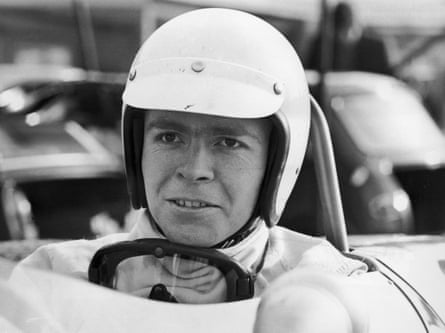
The legacy of the name is one reason, however, why he didn’t follow the path that he most wanted to pursue: politics. Nevertheless, he has floated around the political spectrum almost as much as his father. He considered standing as a Conservative MP but later joined the Labour party, under Blair, and though he left at the time of the Iraq invasion, he still loves the Guardian and hates David Cameron. “Because he took Andy Coulson into the heart of government even though Alan Rusbridger had warned him. I can’t forgive him for that.”
You may not have become an actual politician, I point out, but your career has been politics, politics, politics. He repeatedly references people who are “very clever” or “real intellectuals”, but the fact is that he navigated his way to the top of a global organisation that controls vast multimillion pound interests through a combination of doggedness and charm. (“It’s just been instinctive. I’ve never actually planned anything or done a really clever campaign.”) And he did it, step by step, with Bernie Ecclestone, who he calls “a remarkable person”. Of all the people in his autobiography, it’s Ecclestone who comes across most vividly: the second-hand car salesman who built Formula One into his personal fiefdom. He gradually came to control the entire commercial rights to Formula One and he did it with Mosley. “The strange thing is that the teams agreed every time. It wasn’t until he started to float that they realised just how much money was involved.” Around £6.5bn at the at the time of a proposed flotation in 2013.
They worked together for nearly 40 years, and in the furore that followed the News of the World story, Ecclestone stepped in to lend his voice to those who said that Mosley should resign. In the book, he writes: “Bernie always maintained that pressure from his board was the reason for his actions. I found that difficult to believe but no other explanation has been offered.”
It was a terrible betrayal. But he doesn’t give away an awful lot other than to say that “Bernie would be the first to say that was a major mistake”. That’s the other hole in the book, I point out. There’s an almost complete absence of any emotion.
Of what, he asks? Emotion, I say again.
He considers it. “Well I suppose I’m going to be like Alastair Campbell and say, ‘We don’t do emotion.’ There are one or two places where I say the journalists descended like vultures on my son’s house after his death… But I don’t know. It becomes either maudlin or a rant, and then it looks like you’ve written the book to complain. And I really wrote the book to give an account, so I stood back from it all a bit. Obviously I feel emotion, but I think that some things are private.
“There’s this journalist I really rate from the FT, Lucy Kellaway. She came to interview me and at the end she wrote about how people had asked her, ‘What’s he like?’ And she said, ‘I have no idea.’ I was slightly disappointed. I thought, do I really come across like that? It wasn’t intentional but what I wasn’t going to do was to get emotional about my son. I’m terribly emotional about my son in private, but I’m not going to expose that.”
Because in the middle of it all, a year after the News of the World’s exposé and in the midst of his trials at the FIA, his son Alexander died at 39 of a drugs overdose. The book is dedicated to him, his other son, Patrick, and his wife, Jean. He included Alexander, he says, “because he’s still a big part of my life and was a big part of that life and I talked to him a lot about it.” He knew about his problems with drugs. “But the really difficult thing is, how much do you interfere when somebody’s an adult? I used to talk to him about it a lot. And I went to places like Cottonwood [rehab centre] in Arizona with him. But in the end, somebody’s got to want desperately to get off it. His problem, his fundamental problem, was that he was depressive. And none of the drugs worked. The only one that did work was heroin.”
Another friend who knew Alexander Mosley says that Max was completely devastated by his death. They were very close. Alexander was depressed but, in her view, he never really got over the News of the World’s exposé. It had a huge impact on him.
“I think that’s probably true,” says Mosley. “It’s probably true. It was undoubtedly a fact. Whether it was a key fact, I don’t know. But it’s what’s so wicked, in a way, about newspapers like the News of the World. Nobody stops for one minute to say, ‘What’s the effect on his family? Should we publish this?’”
But they’d always argue that people should think about that before they do things in the first place.
“Well, that’s the classic tabloid argument. You might as well say, if you hadn’t gone out for a walk, you wouldn’t have been mugged.”
There is something remarkable about the way that Mosley pursued first the press, then the government, and then these corporate behemoths, News International, followed by Google. Indeed, what comes across strongly in the book is how much of a risk-taker he is. “Oh, unquestionably. It’s in my nature. And you lose sight now of how much the climate has changed. At that time, Murdoch had the police under control, the government, even parliament. All the great institutions of state except for the judiciary. So you’re taking on this completely ruthless organisation with unlimited resources, and lots of people say, ‘Don’t do it.’ But I just had this feeling that if somebody attacks you, you have to respond.”
And then, finally, we talk about motor sport. The early chapters of the book are a depressing litany of drivers who died. He’s lost so many people he’s known over the years, and making Formula One safer is an achievement he’s proud of. And he still travels the world campaigning for greater road safety. But Formula One, he says again, was only ever “second best”. What was number one? “Politics.”
He hasn’t been to a Grand Prix since 2009. Do you even like cars, I ask? He shrugs and says he’s interested in car technology but there’s “something wrong” with the kind of men who drive supercars around Knightsbridge as if they’re competing at Monza. I wonder if he’s never quite gotten over the adrenaline of racing. It might explain the risk-taking. “Alexander knew the risks,” he says of his son’s drug use. And Mosley must have too. His taste for S&M was a secret he shielded from those closest to him for his entire life, but he must have always known there was a possibility he could be caught.
Was it in any way a relief to be finally found out? “No. I was embarrassed on behalf of my family. But I was just very angry. I thought: these people have no right, they’ve broken the law and I’m going to nail them. It’s like coming home and finding your house has been burgled.”
At the Leveson inquiry, though, he made the point that his wife had only ever been to one public event with him in his entire career. She was a completely private person. Has she forgiven you?
It’s perhaps the first question that gives him pause.
“I don’t know. I never asked her,” he says, and then considers it some more. “I mean, you know. Life goes on.”
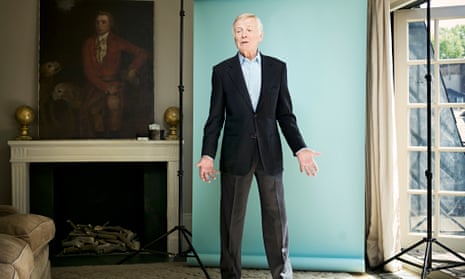
Comments (…)
Sign in or create your Guardian account to join the discussion